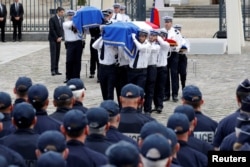For years, al-Qaida and the Islamic State have been urging followers in Western nations to carry out attacks with whatever weapons come to hand, suggesting items as simple as a knife, a car or a fist.
By killing 84 people in the French port city of Nice last Thursday, with a rented truck, Mohammed Bouhlel demonstrated just how lethal that crude technique can be.
“It’s a frightening moment,” said Daniel Benjamin, a former counterterrorism coordinator at the U.S. State Department, now director of the John Sloan Dickey Center at Dartmouth College.“How many easy and simple ways can we identify to kill people?”
With Western intelligence and law enforcement having improved their capabilities since the 9-11 attacks on the U.S., terrorist groups are finding it more difficult to mount the large-scale, complex attacks such as occurred in Bali, Madrid, and London.Instead, counterterrorism officials say homegrown extremists are increasingly turning to low-tech means to cause mayhem.
“What we have seen over time is that (homegrown violent extremists), either lone actors or small insular groups, continue to gravitate toward simple tactics that do not require advanced skills or outside training,” Nicholas Rasmussen, Director of National Counterterrorism Center, told the House Homeland Security Committee on Thursday.
The use of a vehicle as a weapon of terror has a recent history.So-called car-ramming assaults by Palestinian militants have killed dozens in Israel in recent years.
Less lethal have been a series of smaller-scale attacks in France, Britain, Canada and the United States, where Iranian-American Mohammed Reza Taheri-azar drove his car into a crowd of students on the campus of the University of North Carolina in 2006.Nine people were injured in the incident.
“What’s kind of unusual about this [Nice] attack is that such a large vehicle was used against such a large crowd, you had such a huge death toll,” Scott Stewart the Vice President of Tactical Analysis at intelligence advisory Stratfor said via Skype.
Bouhlel did not have to look hard to find inspiration or how-to tips online to carry out his attack.
As early as 2010, al-Qaida urged followers to use a pick-up truck to mow down “the enemies of Allah.”
And in a January, 2015 address, IS spokesman, Mohammad al-Adnani, exhorted sympathizers to kill Westerners with whatever means available, “whether an explosive device, a bullet, a knife, a car, a rock, or even a boot or a fist.”
The appeal has found a receptive audience.
In June, Larossi Abballa, a 25-year-old Frenchman and former jihadi recruiter, used a knife to stab a police officer and his companion in a suburb of Paris.And on Monday, a 17-year-old Afghan asylum seeker went on an axe-and-knife rampage aboard a German train that left at least five people injured before being shot dead by police.
For U.S. intelligence and law enforcement agencies, a Nice-style attack represents a long-feared nightmare with few desirable countermeasures.
“What are you going to do?Take people’s cars away?” Colin Clarke, a political scientist at Rand Corp., said tongue in cheek.
Large security barriers and dump trucks have been used in the past to protect government buildings, and Stewart said “people are going to consider using those sorts of things or large vehicles to block streets during large events in the future.
Copycat attacks are likely to materialize, as extremists of all kinds, from militant environmentalists to violent white supremacists to troubled loners looking for a meaning in life resort to rudimentary tactics to carry out acts of terror, counterterrorism officials and experts say.
“We expect some [homegrown violent extremists] will try to replicate the violence and potentially capitalize on the media coverage and attention that attacks like the one in Florida generated,” Rasmussen said.
With the United States teeming with so-called soft targets and terrorists turning to simple methods, the country needs to think outside the box to prevent future attacks, said Michael Rubin, a former Pentagon official now with the American Enterprise Institute in Washington.
“I think we’re missing the boat,” Rubin said in an interview.“We’re very good at preventing the last terrorist attack.We’re not forward thinking.”
Rubin took issue with the notion of “lone wolves” as operators in a vacuum, arguing that many draw “institutional support” from online radicalization efforts.
“Every lone wolf now has a pack behind them,” he wrote in a blogpost on Friday.
Michael Smith, an intelligence expert and chief operating officer of Kronos Advisory, said despite recent battlefield losses, IS remains a potent threat as it battles al-Qaida for supremacy over the global jihadist movement.
“The fact is that a majority of [recent] terrorism-cases are Islamic State-related cases,” Smith said.“We need to deny them real sanctuaries and cyber sanctuaries.That’s where the near-term focus should be. “
VOA'S Jeff Seldin contributed to this report.





